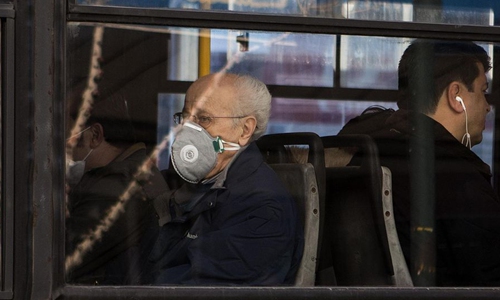HOME >> WORLD
Notable infection rate among Iranian elites as the country locks down cities
By Hu Yuwei, Shan Jie and Cao Siqi Source:Global Times Published: 2020/3/14 23:40:31

A man wearing a mask is seen on a bus in downtown Tehran, Iran, Feb. 23, 2020.(Photo by Ahmad Halabisaz/Xinhua)
Starting from Friday, a lockdown has been enforced in Iran to curb the COVID-19 outbreak as the confirmed cases continue to soar, which has notably affected the elite group in the country.
Iran's Ministry of Health and Medical Education on Saturday said the death toll from the novel coronavirus rose to 611, with the total confirmed cases reaching 12,729, the Xinhua News Agency reported.
The novel coronavirus has been spreading among senior officials and elites in Iran.
Vice President Eshaq Jahangiri; Ali Asghar Mounesan, minister of cultural heritage, handicrafts and tourism; and Reza Rahmani, minister of industry, mines and business are among the notable personalities contracting this infection, according to Aljazeera.
Nasser Sha'abani, a senior general of Iran's elite Islamic Revolutionary Guard Corps has died of coronavirus in Iran on Friday.
Previously, Aljazeera reported the deaths of five other members of Islamic Revolutionary Guard Corps members and an unspecified number of fatalities among the Guard's volunteer Basij force.
Frequent travels of top religious leaders between Qom and Tehran, during Iran's election season, might have led to the virus spreading among elites, said a Tehran-based medical practitioner, specializing in Traditional Chinese Medicine, surnamed Xing.
"The top class in Iran probably did not realize the virus had already cropped up in the country. Even though some people have had symptoms, they perhaps didn't take a test," Xing said.
Since Tehran has better medical facilities, some people from Qom rushed to the capital, which worsened the situation, Xing added noting that traditional greeting gestures like hand-kissing and embrace could have acted as a source of transmission.
"Iran values religions. The officials and elites often gather together for religious activities, which led to the spread," Liu Weilong, a 28-year-old Chinese vlogger, told the Global Times Saturday. Liu recently flew back to China from Iran on the special flight dispatched by the Chinese government.
Iran's army said Friday they will start vacating streets, roads, and shopping centers to avoid the unnecessary presence of people.
Javad Hashemzade, a travel agency owner, said though the army has swung into action to control the outbreak, it will take days for the outcome. "There are still a lot of people on the streets and the roads connecting different cities. Many people seem unworried," he told the Global Times Saturday.
Hashemzade noted the Nowruz, the Iranian New Year, is approaching and it will be celebrated in the next few days. Even though most shops have temporarily closed down, many people still wish to go festive shopping, which would be a big challenge for the government.
But Hashemzade noted the majority of religious sites have already closed.
To make things worse, only half of the Iranians could afford to wear masks due to the shortage and high prices, Hashemzade added.
Considering the US' sanctions and the dampen economic situation in Iran this year, the government's efforts in controlling the epidemic have been effective, he said. "We are concerned about the shortage of medical devices. We want to know when the epidemic could end."
Xing said the prevention measures in communities are still slacking off. Meat and other essential commodities in supermarkets have run out of stock.
"Compared with the MERS in 2015, this time the magnitude of the epidemic is greater and the infection rate is higher… I have been here for almost two decades, this is the most serious epidemic crisis," Xing said.
China has been sending medical supplies to Iran for confronting the COVID-19 outbreak. A medical team with Chinese experts arrived in Tehran in early March.
The Chinese Ambassador to Iran Chang Hua, on Thursday, wrote an article for IRNA, highlighting the significance of China-Iran bilateral ties in the face of this pandemic.
Though the entire world is at a crucial juncture of the pandemic and confronting the COVID-19 outbreak, the US continues to blame China by claiming China lacks transparency, Chang wrote in his piece, adding that the US' sanctions on Iran put the extra burden to Iran.
Posted in: MID-EAST